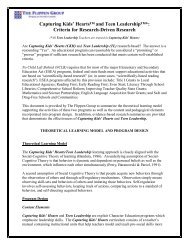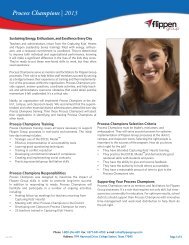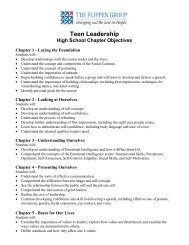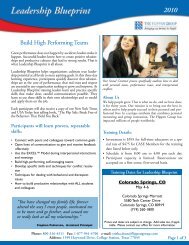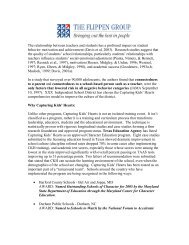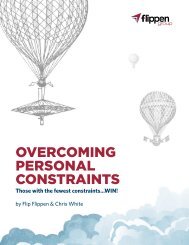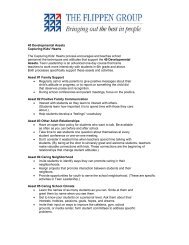Smart & Good High Schools - The Flippen Group
Smart & Good High Schools - The Flippen Group
Smart & Good High Schools - The Flippen Group
- No tags were found...
You also want an ePaper? Increase the reach of your titles
YUMPU automatically turns print PDFs into web optimized ePapers that Google loves.
CHAPTER 5: Fostering the 8 Strengths of Character—Outcome 6THE REWARDS OF WAITING1. Waiting will make your dating relationships better.You’ll spend more time getting to know each other.2 Waiting will help you find the right mate (someonewho values you for the person you are).3. Waiting will increase your self-respect.4. Waiting will gain the respect of others.5. Waiting teaches you to respect others (you’ll nevertempt or pressure anyone).6. Waiting takes the pressure off you.7. Waiting means a clear conscience (no guilt) andpeace of mind (no conflicts, no regrets).8. Waiting means a better sexual relationship in marriage(free of comparisons, based on trust). By waiting,you’re being faithful to your spouse even beforeyou meet him or her.9. By practicing the virtues involved in waiting—suchas faithfulness, good judgment, self-control, modesty,and genuine respect for self and others—you’re developing the kind of character that willmake you a good marriage partner and that willattract a person of character—the kind of personyou’d like to marry and would like to be the fatheror mother of your children.Develop A Future OrientationIt’s not enough just to encourage teens to “wait.” <strong>The</strong>ywant to know what they’re waiting for. To get out of highschool? To turn a certain age? Until they feel “ready”? Oruntil they’re in a mature, committed relationship wheresex makes sense because it expresses and deepens thatgenuine commitment? <strong>The</strong> power to resist the sexualtemptation of the moment comes from having a vision ofimportant future goals and how waiting for sex will helpto achieve them.In her book <strong>The</strong> Power of Abstinence, Kristine Napier nameseight short-term and long-term rewards of waiting 31 ; aninth comes from Dr. Janet Smith, formerly of the Universityof Dallas. (See box above.)One of the strongest ways to cultivate a future orientationin adolescents is to encourage them to consider marriageas an important life goal. Teachers and parents seeking todo that can find help from Rutgers University’s NationalMarriage Project. (See the box below for five items fromthe Project’s research-based pamphlet, “Ten Things TeensShould Know About Marriage.”)<strong>The</strong> book Cultivating Heart and Character: Educating forLife’s Most Essential Goals, by Tony Devine and colleagues,includes several chapters on preparing young people forhealthy marriages and families and helping them to placesex in that context. 32 <strong>The</strong> Dibble Fund for Marriage Education(www.dibblefund.org) offers curricula, pamphlets,and activity books for developing “relationship smarts”and “marriage smarts.” Hungry Hearts, a report from theInstitute for American Values (www.americanvalues.org),uses five criteria to evaluate 10 leading marriage and relationshipcurricula in use in U.S. schools. 335 THINGS TEENS SHOULD KNOW ABOUTMARRIAGE (ABRIDGED)<strong>The</strong> social science research on which these suggestionsare based can be found at the website of theNational Marriage Project, http://marriage.rutgers.edu.1. Consider making marriage a top goal for your life.Married people are healthier, wealthier, and happierthan people who just live together or stay single.2. Learn relationship skills. Take advantage of anyrelationship and marriage education courses offeredby your school, religious group, or other communitygroup.3. Marry in your 20s or older. People who get marriedin their teens are two to three times more likelyto get divorced than people who get married intheir 20s or older.4. Wait to have a child until after you are marriedand at least 20 years old. <strong>The</strong> children of unwedparents face greater risks for problems of all kinds,including depression and mental illness, schooldropout, teen pregnancy, crime, poverty, substanceabuse, and suicide.5. Think twice before you decide to live with someoneoutside of marriage. Contrary to popular belief, livingtogether before marriage is linked to a less satisfyingmarriage and a higher divorce risk. And themore partners you live with, the more likely you areto divorce when you do marry.170<strong>Smart</strong> & <strong>Good</strong> <strong>High</strong> <strong>Schools</strong>




